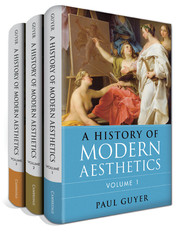Book contents
- Volume 1 The Eighteenth Century
- Frontmatter
- Epigraph
- Contents
- Acknowledgments
- Introduction
- 1 Prologue
- Part One Aesthetics in Britain, 1725–1800
- Part Two French Aesthetics in Mid-Century
- 5 André to Rousseau
- Part Three German Aesthetics between Wolff and Kant
- Part Four Kant and After
- Bibliography
- Index
- Volume 2 The Nineteenth Century
- Volume 3 The Twentieth Century
- References
5 - André to Rousseau
from Part Two - French Aesthetics in Mid-Century
Published online by Cambridge University Press: 05 June 2015
- Volume 1 The Eighteenth Century
- Frontmatter
- Epigraph
- Contents
- Acknowledgments
- Introduction
- 1 Prologue
- Part One Aesthetics in Britain, 1725–1800
- Part Two French Aesthetics in Mid-Century
- 5 André to Rousseau
- Part Three German Aesthetics between Wolff and Kant
- Part Four Kant and After
- Bibliography
- Index
- Volume 2 The Nineteenth Century
- Volume 3 The Twentieth Century
- References
Summary
After Du Bos’s Critical Reflections of 1719, a quarter-century passed before another work appeared in France that would have an equal impact upon the development of aesthetics both within that country and across Europe more generally. This was Les Beaux-Arts réduit à un même principe (“The Fine Arts reduced to a single principle”) of Charles Batteux, which first appeared in 1746. Batteux’s work has often been held to be the source of the modern conception of the fine arts as a single group, distinguished not only from the natural sciences but also from all other forms of craft and technology. Be this as it may, the single principle to which Batteux’s title refers is the principle that all art is imitation of nature and that the standard for genius in the production of art and for taste in the reception and judgment of art is therefore also the imitation of nature. Surely this must mean that Batteux responded to Plato by defending art as a vehicle for the cognition of truth and thus that he rejected Du Bos’s response to Plato that the arts afford us an intrinsically pleasurable play of the emotions that has its own form of value. But it would be misleading to read Batteux in this way. For Batteux, the imitation of nature merely offers art the materials by means of which it can exercise our cognitive powers on the one hand and our emotional capacities on the other. Thus, although neither Batteux nor the successors who accepted his framework – the Encyclopedists Jean Le Rond D’Alembert and Denis Diderot and others of their circle – explicitly analyzed aesthetic experience as a free play of our cognitive and/or moral and emotional powers, their views were really not so different from those of their contemporaries across the Channel.
- Type
- Chapter
- Information
- A History of Modern Aesthetics , pp. 247 - 302Publisher: Cambridge University PressPrint publication year: 2014



